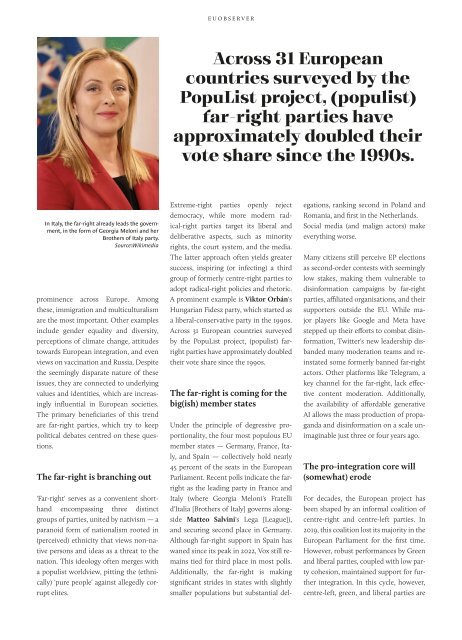EU Elections
EUobserver's guide to the 2024 European Parliament Elections.
EUobserver's guide to the 2024 European Parliament Elections.
- No tags were found...
Create successful ePaper yourself
Turn your PDF publications into a flip-book with our unique Google optimized e-Paper software.
<strong>EU</strong>OBSERVER<br />
Across 31 European<br />
countries surveyed by the<br />
PopuList project, (populist)<br />
far-right parties have<br />
approximately doubled their<br />
vote share since the 1990s.<br />
In Italy, the far-right already leads the government,<br />
in the form of Georgia Meloni and her<br />
Brothers of Italy party.<br />
Source:Wikimedia<br />
prominence across Europe. Among<br />
these, immigration and multiculturalism<br />
are the most important. Other examples<br />
include gender equality and diversity,<br />
perceptions of climate change, attitudes<br />
towards European integration, and even<br />
views on vaccination and Russia. Despite<br />
the seemingly disparate nature of these<br />
issues, they are connected to underlying<br />
values and identities, which are increasingly<br />
influential in European societies.<br />
The primary beneficiaries of this trend<br />
are far-right parties, which try to keep<br />
political debates centred on these questions.<br />
The far-right is branching out<br />
'Far-right' serves as a convenient shorthand<br />
encompassing three distinct<br />
groups of parties, united by nativism — a<br />
paranoid form of nationalism rooted in<br />
(perceived) ethnicity that views non-native<br />
persons and ideas as a threat to the<br />
nation. This ideology often merges with<br />
a populist worldview, pitting the (ethnically)<br />
'pure people' against allegedly corrupt<br />
elites.<br />
Extreme-right parties openly reject<br />
democracy, while more modern radical-right<br />
parties target its liberal and<br />
deliberative aspects, such as minority<br />
rights, the court system, and the media.<br />
The latter approach often yields greater<br />
success, inspiring (or infecting) a third<br />
group of formerly centre-right parties to<br />
adopt radical-right policies and rhetoric.<br />
A prominent example is Viktor Orbán's<br />
Hungarian Fidesz party, which started as<br />
a liberal-conservative party in the 1990s.<br />
Across 31 European countries surveyed<br />
by the PopuList project, (populist) farright<br />
parties have approximately doubled<br />
their vote share since the 1990s.<br />
The far-right is coming for the<br />
big(ish) member states<br />
Under the principle of degressive proportionality,<br />
the four most populous <strong>EU</strong><br />
member states — Germany, France, Italy,<br />
and Spain — collectively hold nearly<br />
45 percent of the seats in the European<br />
Parliament. Recent polls indicate the farright<br />
as the leading party in France and<br />
Italy (where Georgia Meloni's Fratelli<br />
d'Italia [Brothers of Italy] governs alongside<br />
Matteo Salvini's Lega [League]),<br />
and securing second place in Germany.<br />
Although far-right support in Spain has<br />
waned since its peak in 2022, Vox still remains<br />
tied for third place in most polls.<br />
Additionally, the far-right is making<br />
significant strides in states with slightly<br />
smaller populations but substantial delegations,<br />
ranking second in Poland and<br />
Romania, and first in the Netherlands.<br />
Social media (and malign actors) make<br />
everything worse.<br />
Many citizens still perceive EP elections<br />
as second-order contests with seemingly<br />
low stakes, making them vulnerable to<br />
disinformation campaigns by far-right<br />
parties, affiliated organisations, and their<br />
supporters outside the <strong>EU</strong>. While major<br />
players like Google and Meta have<br />
stepped up their efforts to combat disinformation,<br />
Twitter's new leadership disbanded<br />
many moderation teams and reinstated<br />
some formerly banned far-right<br />
actors. Other platforms like Telegram, a<br />
key channel for the far-right, lack effective<br />
content moderation. Additionally,<br />
the availability of affordable generative<br />
AI allows the mass production of propaganda<br />
and disinformation on a scale unimaginable<br />
just three or four years ago.<br />
The pro-integration core will<br />
(somewhat) erode<br />
For decades, the European project has<br />
been shaped by an informal coalition of<br />
centre-right and centre-left parties. In<br />
2019, this coalition lost its majority in the<br />
European Parliament for the first time.<br />
However, robust performances by Green<br />
and liberal parties, coupled with low party<br />
cohesion, maintained support for further<br />
integration. In this cycle, however,<br />
centre-left, green, and liberal parties are

















